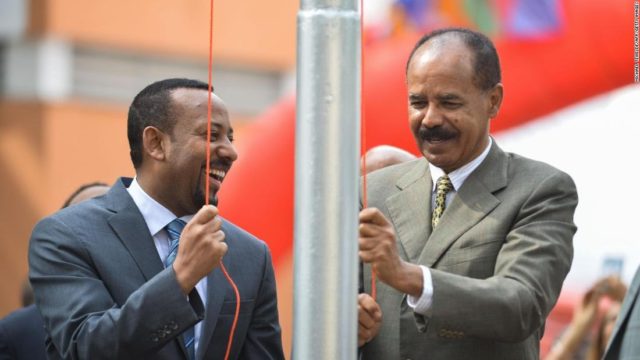Editor’s Note: (Sam Kiley is a CNN Senior International Correspondent. The opinions in this article belong to the author. )
(CNN)They walked stiff-kneed and hunched, their eyes wide to the whites as they emerged from the frontline of a war that must rank among the most stupid and wasteful of the last century.
These young men were Eritrean conscripts. Their comrades had been left on the Zalembessa frontline, crushed into the soil by tanks and torn apart by artillery bombardments.
No one then — nor in the two decades that followed — really knew why this war started. Much less why it kept going
It’s over now, the result of diplomatic interventions from Arabia floated on a lake of petrodollars.
The families of those who died in this obscure war– in which perhaps 100,000 perished — will take cold comfort from knowing their loved ones were the victims of what may have been the most violent family squabble in Africa’s history.
The sheer scale of death and the industrial savagery of the war between Eritrea and Ethiopia was reminiscent of World War II. In terms of the futile waste of humanity, it rivaled the meat grinding mess of the Western Front in WWI.
And yet, those who died should have been looking towards an entirely different future. They were robbed of optimism that came from the recent end of another war, by the vanity and hubris of their leaders.
After all, Ethiopia’s Meles Zenawi and Eritrea’s Isaias Afwerki, had been on the same side for many decades.
As rebel commanders in the Tigray People’s Liberation Front and the Eritrean People’s Liberation Front, they had fought the Soviet-backed Ethiopian dictator Mengistu Haile Mariam from caves and bush camps through the 70s and 80s.
Joining forces as the Ethiopian People’s Revolutionary Democratic Front, they stormed Ethiopia’s capital, Addis Ababa, after Mengistu fled into exile in 1991. Together, they won.
The EPRDF, under the leadership of Meles (note this is correct use of name) and Afwerki, appeared to be incorruptible Spartan warriors from Africa’s Horn.
They gave hope that Ethiopia could emerge as a beacon across Africa as the continent faced turmoil with the end of the Cold War.
Early on things went well. Eritrea was granted independence in 1993 from big brother, Ethiopia. Afwerki became its first (and only) president. Meles was Ethiopia’s Prime Minister.
Five years later, they were at war.
Neither nation ever adequately explained why.
The conflict broke out in skirmishes over control of a vague border around a town or village called Badme. The arid flatlands became the casus belli that claimed tens of thousands of lives over the next two years. Some estimates suggest that upwards of 100,000 died.
Meles and Afwerki had been close — they were cousins. And now they were using all their years of experience or guerrilla war plus the vast armory of the former Ethiopian regime to smash their nations’ youth into pulp.
Dubbed a “crazy war” in the Horn of Africa by both Ethiopian and Eritrean media, it was a conflict that seemed to stem from nothing more than filial rivalry — a notion that each side demanded and wasn’t getting “respect.”
Respect, it seemed, was earned by throwing tens of thousands of young men and women into battle and squandering billions of dollars of currency neither nation could afford on a war of no strategic importance of any kind.
This week the war came officially to an end. It didn’t end because sense finally prevailed.
The United Nations and regional powers had tried to get both sides to abandon the conflict — even drawing up mutually agreed borders along arid plains and through mountain cuts, many times since 1998.
Meles died six years ago. His death, perhaps, removed part of the reason for continuing what was mostly by then a cold conflict.
But Afwerki remains in power. He’s long had reason to keep his nation at war, as he has no democratic legitimacy of any kind.
Eritrea sits on the Red Sea. Its capital, Asmara, is nestled in the cool highlands and boasts Italian colonial architecture and an ethnically homogeneous population (a rarity in Africa). Its tourist potential is vast.
But 12% of its people fled the country by 2016 — mostly to escape the forced conscription that enslaved tens of thousands into “national service”, according to Human Rights Watch.
Afwerki’s dictatorship once needed the conflict with Ethiopia to harness the national resource keeping him in power. Universal slave-like indefinite conscription is easier to justify in times of “war.”
Now regional players have a more important role for both Eritrea and Ethiopia, so their pointless war has become a distraction.
The United Arab Emirates and Saudi Arabia are prosecuting their own conflict against Houthi rebels, Shi’a Muslims backed by Iran, in Yemen. Eritrea’s coastline provides the coalition’s forces with the havens they need to fight in Yemen.
Allowing the Red Sea to be choked off between Eritrea and Yemen is inconceivable. So the UAE wants bases — and will pay for them — in Eritrea.
The UAE has invested heavily in Eritrea and is promising to pay for an oil pipeline to link it to Ethiopia.
On top of that, Ethiopia has received, or will get, a $1 billion deposit into its central bank and $2 billion in additional investments from the UAE, Ethiopian officials have said.
It’s too late for the broken youth of two decades ago.
But Eritrea and Ethiopia have, effectively, been paid by Gulf nations to sign a peace accord in Jeddah under the indulgent eye of Saudi Arabia’s King Salman. Let’s hope they get value for their money.



























